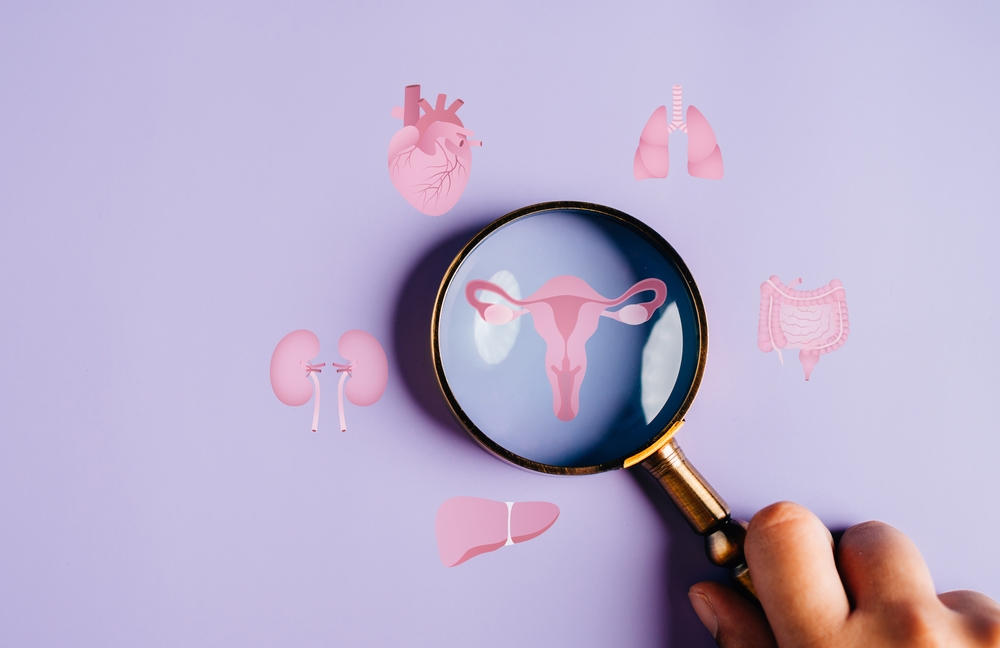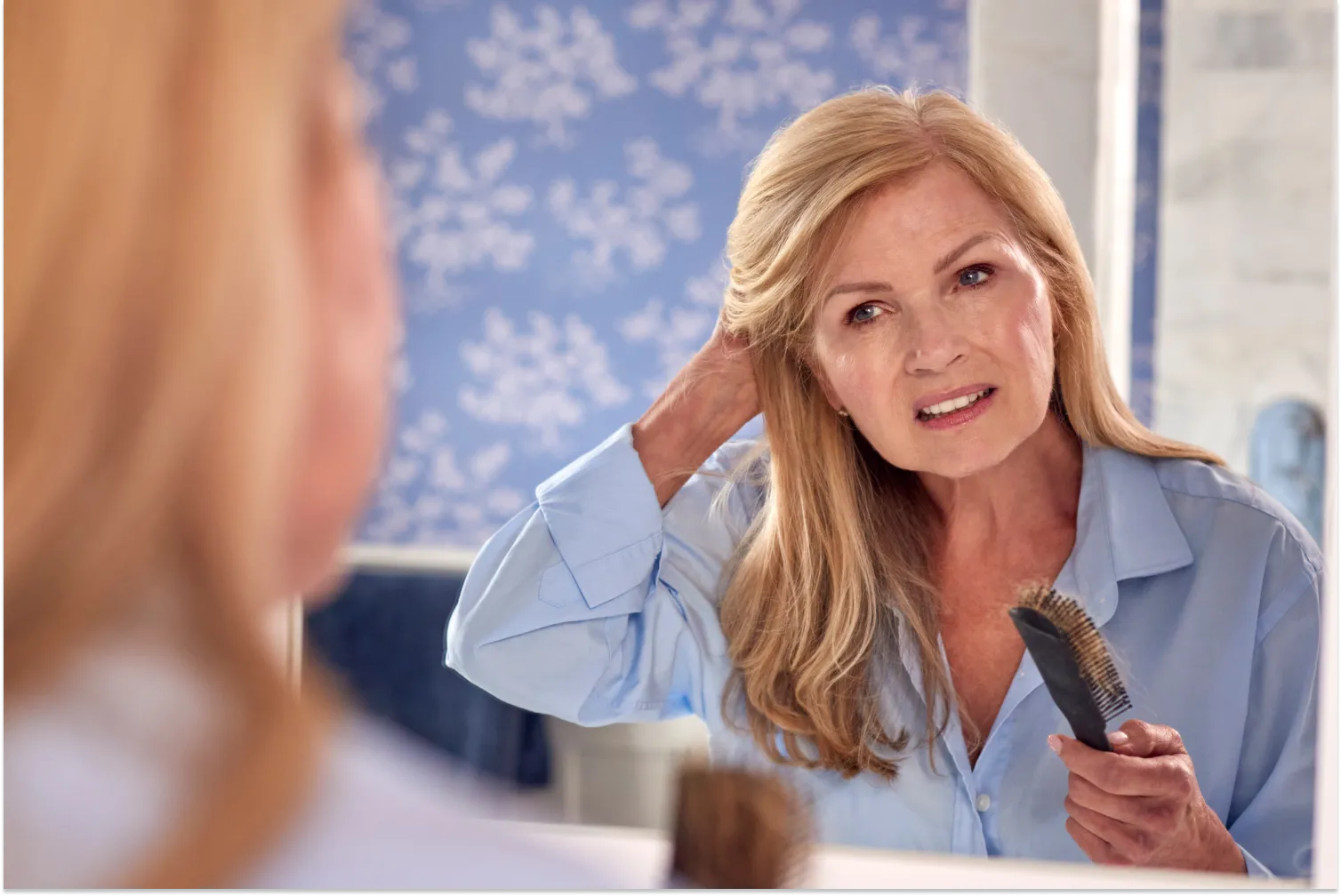PCOS (polycystic ovary syndrome) is a hormonal disorder that affects women of reproductive age. It occurs when the ovaries produce excess androgens, or male hormones, which disrupt the body's balance.
This hormonal imbalance can trigger a variety of symptoms, including PCOS acne. Such hormonal acne typically appears on the face, back, and shoulders and is more persistent than regular acne. Too much oil and clogged pores cause acne, which causes bacteria to grow.
Women with PCOS are 1.6 times more likely to experience acne compared to those without the condition. This blog will explore how PCOS contributes to hormonal acne, the role of insulin resistance, and how PCOS acne treatment can help.
Additionally, we'll discuss lifestyle changes that can improve skin health and help manage other symptoms of PCOS.

What Is PCOS?
Polycystic ovary syndrome occurs when the ovaries produce too many androgens. This imbalance may disrupt the normal functioning of the ovaries, causing problems such as irregular menstrual cycles and the development of fluid-filled cysts on the ovaries. These sacs, also called cysts, can disrupt normal ovulation.
The exact cause of PCOS isn't fully understood, but several factors may contribute, including genetics and insulin resistance. In women with polycystic ovary syndrome, insulin resistance can lead to higher insulin levels, which may affect the ovaries and increase androgen levels.
Common PCOS symptoms include:
- Irregular menstrual periods or absence of periods
- Excess hair growth (hirsutism) on the body and face
- Oily skin
- Acne
- Thinning hair
- Weight gain or difficulty losing weight
Although this condition has no cure, you can manage symptoms through lifestyle changes and medical treatments.
What Does PCOS Acne Look Like?
Most people experience acne at some point in their lives, but not all breakouts are the same. If you're noticing frequent or stubborn acne, it may be due to polycystic ovary syndrome.
PCOS acne tends to behave differently from typical breakouts. It often appears as:
- Deep, painful bumps under the skin, similar to cystic acne
- Clusters along the chin, jawline, or lower cheeks
- Red, inflamed spots that may take longer to heal
Unlike occasional pimples, PCOS-related acne lingers and often resists common skin care products and over-the-counter treatments. This is because the underlying issue is not just clogged pores; it is a hormone imbalance.
If your breakouts are consistent, located on the lower part of your face, and do not clear up easily, they could be linked to PCOS. However, acne alone is not sufficient for a diagnosis. PCOS varies from person to person, and not everyone with this condition will experience severe acne.
To determine whether PCOS is the cause of your acne, a healthcare provider may recommend tests to check hormone levels or perform an ultrasound. These steps can identify the root cause and guide you toward the appropriate treatment.
How to Diagnose PCOS and Related Acne Conditions
If you've tried every acne cream and your breakouts still won't budge, it might not be your skincare; it could be your hormones.
Persistent adult acne often points to something going on under the surface, and one common reason is PCOS. Healthcare professionals usually start by asking about your medical history. They'll want to know how often you get acne, where it appears, and whether you're experiencing other symptoms, such as irregular periods or excessive hair growth.
Blood tests are an important part of the diagnostic process. They help measure hormone levels, including androgens, which may be high in people with PCOS. Insulin levels are also checked, as insulin resistance is common with the condition.
Additionally, some medical providers may suggest an ultrasound to look for small fluid-filled sacs on your ovaries, which are common in this condition. Most people consult a primary care physician or an obstetrician-gynecologist (OB-GYN).
However, if things still aren't clear, a referral to a reproductive endocrinologist might help. They're specialists in hormones and can help you figure out the underlying cause. A timely and accurate diagnosis helps treat not just the acne but the underlying hormonal imbalance.
Recognizing and treating PCOS early can also lower the risk of other health concerns, like diabetes or fertility issues.

Treatment Options for PCOS-Related Acne
Polycystic Ovary Syndrome (PCOS) can cause several skin issues, with acne being one of the most common. Managing PCOS-related acne often requires a combination of hormonal treatments, topical and oral acne therapies, and lifestyle changes. Let's explore these treatment options in detail:
Hormonal Treatments
One of the primary ways to manage PCOS-related acne is through hormonal treatments. Oral contraceptives, also called birth control pills, are frequently prescribed for this purpose.
These pills regulate reproductive hormones and reduce androgen production, which contributes to acne. Oral contraceptive pills restore ovulation and regulate menstrual cycles, two factors often disrupted in women with PCOS. By balancing hormones, birth control pills can reduce excess sebum production, which is one of the causes of acne.
Researchers have found a 30-60% reduction in inflammatory acne within 3 to 6 months of using oral contraceptive therapy. Approximately 50-90% of individuals who undergo this treatment report seeing an improvement in acne lesions.
For some, hormonal birth control alone may be enough to manage acne. In some cases, combining birth control with medications like Metformin can help manage PCOS symptoms more effectively, which may also lead to a noticeable reduction in acne. This method targets the hormone imbalance that causes the problem.
Topical and Oral Acne Treatments
In addition to hormonal treatments, various topical and oral acne treatments can help reduce the appearance of acne. Salicylic acid and benzoyl peroxide are commonly used over-the-counter treatments.
These ingredients work by unclogging pores, reducing inflammation, and killing bacteria that cause acne. Benzoyl peroxide is particularly effective for treating acne vulgaris, the most common type of acne, as it helps to decrease the number of bacteria on the skin.
However, a drawback of benzoyl peroxide is its potential to cause dryness or irritation, especially for sensitive skin. Similarly, salicylic acid exfoliates the skin and clears pores, but it may not be strong enough for more severe acne.
Topical antibiotics, such as clindamycin, and oral antibiotics, like tetracycline or doxycycline, are also used for treating acne vulgaris. These antibiotics reduce inflammation and bacteria on the skin. However, long-term use of oral antibiotics can cause side effects, such as antibiotic resistance, so they are typically prescribed for a limited duration.
Additionally, people who are trying to get pregnant should avoid using oral antibiotics and some topical treatments, as they may interfere with fertility.
Hormonal Therapies
Hormonal therapy is a common treatment for acne related to polycystic ovary syndrome (PCOS) because it addresses the underlying hormonal imbalances.
Acne in individuals with PCOS is often linked to these hormonal issues, so therapies aimed at regulating hormones can effectively reduce both acne and other associated symptoms. Fem Excel offers a targeted hormonal therapy designed to correct these imbalances.
Our treatment combines a carefully balanced mix of hormones, which not only helps reduce acne but also restores menstrual cycles and supports fertility for some women.
Lifestyle Changes
Make simple lifestyle changes to see a significant difference in your PCOS-related acne. One of the most effective methods is weight management.
You can maintain a healthy weight by improving insulin sensitivity and balancing hormone levels, which is crucial in managing PCOS symptoms. Losing weight can significantly impact insulin resistance, a common issue in women with PCOS.
A trial looked at how a balanced diet affects insulin resistance in women with PCOS. It reviewed results from 19 different trials and found that dietary changes, primarily through calorie control or approaches like the DASH diet, can help lower fasting insulin levels and improve body weight and waist circumference.
These changes not only help with insulin sensitivity but can also support hormone balance over time. Additionally, achieving a healthy weight can regulate the menstrual cycle and improve overall reproductive health, further aiding in acne management.
A balanced diet is another key factor supporting skin health and hormonal regulation. Eating foods rich in antioxidants, such as fruits and vegetables, can help reduce inflammation and promote clearer skin. Omega-3 fatty acids, found in fish and nuts, also help balance hormones and improve acne.
Avoid processed foods, refined sugars, and excessive dairy products to prevent blood sugar spikes and reduce acne flare-ups. Furthermore, incorporating exercise into your daily routine can help you lose weight and improve insulin sensitivity.
Physical activities like walking, swimming, or cycling help regulate blood sugar levels and support overall health. Exercise also reduces emotional distress, which is a significant trigger for acne breakouts.
When To Do When Acne Becomes Severe
Severe acne in women with PCOS can be a sign of a deeper hormonal problem. Painful breakouts that don't improve with basic skincare often require medical treatment.
These breakouts are usually linked to hormone changes and may also come with other health issues like high blood pressure or insulin resistance. If someone is also struggling with fertility, their medical provider might suggest looking into advanced options like in vitro fertilization (IVF).
This is often discussed when regular treatments haven't worked to bring back ovulation. Managing other health conditions, especially high blood pressure, is also important. PCOS often affects more than just the skin. A treatment plan that looks at acne, hormone levels, and overall health can give better results.
Tips For Managing Acne
Managing acne tied to PCOS often requires a consistent skincare routine alongside medical treatment. A simple, gentle approach is usually best. Harsh products can irritate the skin and exacerbate acne.
Instead, use a cleanser that removes excess oil without drying your skin. Avoid scrubbing or over-washing as it can cause inflammation. Choose non-comedogenic products, as these won't clog pores. Moisturizers and sunscreens labeled "oil-free" or "for acne-prone skin" are safer choices.
Topical treatments with ingredients like benzoyl peroxide or salicylic acid may help with active breakouts. However, these should be used sparingly and with guidance from a healthcare provider. If you wear makeup, remove it thoroughly before bed. Skipping this step can trap oil and bacteria, which eventually trigger acne.
Consistency is key. Clearer skin takes time, so avoid switching products too often. Speak to a dermatologist for personalized advice, especially if over-the-counter options aren't working.
Conclusion
PCOS-related acne often begins with a hormone imbalance. Treating acne without looking at the cause can lead to more breakouts over time.
A better approach focuses on both skincare and treating the root issue, i.e., PCOS. Together, these steps can help reduce acne, balance your cycle, and improve your overall well-being. Mild acne may respond to basic skin products, but more severe or persistent breakouts usually require medical care.
A healthcare provider can run tests, review your symptoms, and create a plan tailored to your needs. This is especially helpful if acne affects your confidence or if you're planning to get pregnant. Managing PCOS acne can take time, but it is possible.
When you treat both the skin and the condition behind it, results are more likely to last. Getting help early can prevent the problem from getting worse. If you're ready to take the next step, Fem Excel is here to guide you. We provide personalized care for maintaining hormone balance, promoting skin health, and achieving reproductive goals.
Our team can explain what is happening in your body and recommend treatments that suit your needs. Take a free assessment today.

Get HRT Online
Optimize Your Hormones
References
1. Benyaminpour, S. (2024). PCOS and acne: A Systematic review. International Journal of Clinical Studies and Medical Case Reports, 37(2). https://doi.org/10.46998/ijcmcr.2024.37.000906
2. Gainder, S., & Sharma, B. (2019). Update on management of polycystic ovarian syndrome for dermatologists. Indian Dermatology Online Journal, 10(2), 97. https://doi.org/10.4103/idoj.idoj_249_17
3. Shang, Y., Zhou, H., Hu, M., & Feng, H. (2020). Effect of diet on insulin resistance in polycystic ovary Syndrome. The Journal of Clinical Endocrinology & Metabolism, 105(10), 3346-3360. https://doi.org/10.1210/clinem/dgaa425






